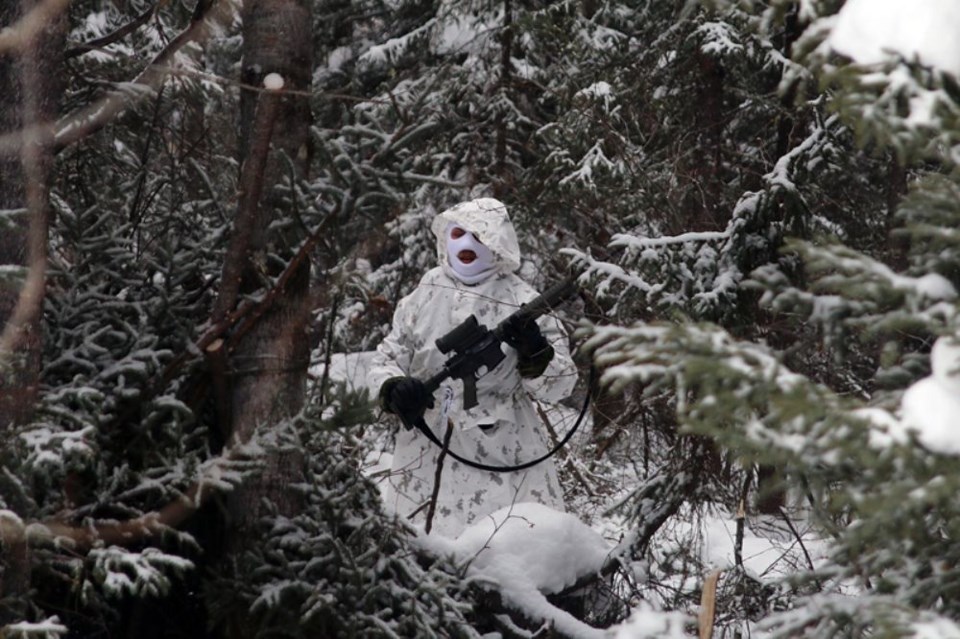MUSKRAT DAM, Ont. – At any moment, there are Canadian Armed Forces members stationed in various locations around the world.
But for a group of Ontario soldiers their most recent task was closer to home than Europe or the Middle East.
More than 900 soldiers from the 4th Canadian Division spent last week deployed to 13 remote Northwestern Ontario First Nation communities as part of Operation Trillium Response training mission.
Lt. Col. Garry Moore, commanding officer of the Toronto Scottish Regiment, said the exercise was built on three objectives, which were to build a sense of community with First Nation leaders and residents, engage in mutual training with the Canadian Rangers and to create a positive environment if troops need to be deployed in the case of emergency.
“The one thing contextually we haven’t had in the Canadian Forces is the real opportunity for us to practice and then do something. A lot of the communities north, when the military does go in it’s a last minute crisis situation,” Moore said.
“This was an opportunity for the Canadian Forces to be seen as regular Canadians and as peers so when we come back we’re actually their neighbours helping them.”
The mission was comprised of three zones which spanned communities as far west as Muskrat Dam and Sachigo Lake all the way east to communities on the shore of James Bay.
In each of those communities the military members worked with the Rangers to learn winter survival skills such as ice fishing and trapping, as well as how to build emergency shelter. They also conducted exercises like water rescues, ground search and rescue and a mock major air disaster scenario.
“The fact the military came here, hopefully we created value for each other so the community realizes the Rangers are part of a bigger team,” Moore said. “For our team, that hear of the Rangers, they now know the Rangers are our Canadian Forces brothers and sisters of the north.”
During the exercise, a Community Day was held in each location to allow the soldiers to directly interact with community members.
Muskrat Dam Chief Stan Beardy said it was a positive for his community to have the nearly 50 soldiers spend the five-day training mission up north.
It allowed those soldiers, all from the Toronto area, to witness and experience how to live off the land in some of the harshest parts of the province.
“It gives the local Rangers and local community people the opportunity to showcase their culture and survival skills,” Beardy said.
“I think to have a relationship you have to have an appreciation for the other group. In our case, the members of the dominant society being here see us in our culture and our setting I think they understand this is a way of life, that we’ve lived like this for a long time and they have a lot to learn from us.”
It also allowed the Ranger program, the closest thing many communities have to an emergency response, to gain an increased standing through being seen in their position as a branch of the Canadian Armed Forces alongside members of the army.
“In a remote setting like this we don’t have a first response. If we call the OPP in a major incident, because they’re busy all the time, it might be a few hours before we get a response,” Beardy said. “But if we have trained personnel, the Rangers, we can just run them up and address our situation.”
For Canadian Rangers Pte. Jeff Fiddler, it was the first time he was able to work directly alongside army soldiers. He has served with the Rangers for the past few years after spending 15 years trying to join.
The Rangers are responsible for conducting ground search and rescue operations, assisting with evacuations, liaison work with other agencies such as police forces or the military and other security support roles.
Being able to have the experience of working with the soldiers is only going to make the Rangers’ work more effective.
“I believe it’s very important for the nation as well to keep our partnership going and keep it strong. With exercises like this it makes it better for the whole nation,” Fiddler said.
